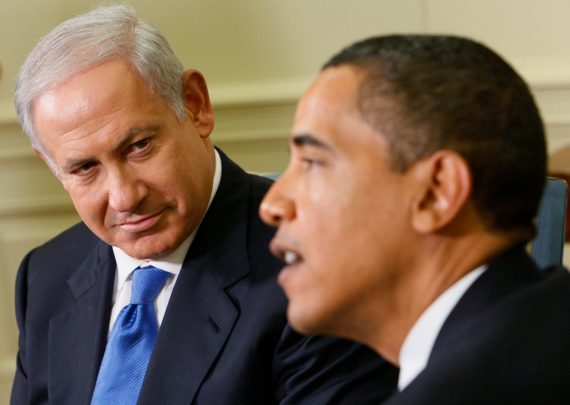Is Obama Bullying Israel on Peace Talks?
The United States is pressuring the Netanyahu government to move off its hard line.
Under the headline “U.S. pressuring Netanyahu to accept Obama’s peace plan,” Haaretz reports the Obama administration is frustrated with Israel’s recalcitrance.
Washington is pressuring Prime Minister Benjamin Netanyahu to accede to its proposal to resume Israeli-Palestinian peace talks on the basis of U.S. President Barack Obama’s May 19 speech.
An Israeli source who spoke recently with senior officials in Washington said the Americans were very frustrated with Netanyahu’s behavior, feeling that he was impeding America’s efforts to keep the Palestinians from unilaterally seeking UN recognition of a state in September.
Netanyahu’s personal envoy, Isaac Molho, spent last week in Washington, where the Americans presented their proposal for resuming talks on the basis of Obama’s speech. Specifically, Obama’s plan calls for negotiating over borders and security first, while deferring issues such as Jerusalem and the refugees until later. It also calls for the borders to be based on the 1967 lines, with mutually agreed land swaps.
The Americans told Molho that to block European initiatives such as France’s proposal for an international peace conference in Paris, they must have something concrete to offer, like Netanyahu’s agreement to negotiate on the basis of Obama’s speech.
So, Obama is privately telling Israel that it wants them to do what he’s publicly stated is his policy preference? And couching it in terms of American ability to help Israel fend off greater pressure from less sympathetic Europeans? That’s hardly shocking.
An Israeli source who maintains close ties with both senior U.S. officials and people close to Netanyahu said that Washington’s frustration began with Netanyahu’s trip to Washington last month, when he publicly fought with Obama and then refused in an address to Congress to endorse the president’s outline for talks. The Americans were now speaking very harshly of Netanyahu, said the source.
“He’s asking us to protect him in September, but he isn’t giving us any tools with which to help him,” the source quoted one American official as saying. “Instead of helping us, he’s making it harder for us.”
As a result, American officials complained, Obama was unable to get Britain and France to commit to opposing a unilateral Palestinian move when he visited Europe last month.
“The Americans need Israel inside, but Netanyahu isn’t there yet,” the source said. “To date, from the American and European perspective, Israel hasn’t given anything.”
European diplomats said Netanyahu’s speech to Congress was viewed in Europe as one long “no” and had thus increased European distrust of him. “We want to hear Netanyahu say he’s willing to negotiate on the basis of Obama’s speech and that he’ll discuss borders based on the 1967 lines with land swaps,” said one diplomat.
Israel’s increasing hard line since the first Intifada dissipated most of the good will it had in Europe. The natural antipathy for Palestinians, whose chief spokesman was leader of a terrorist group, and support for a Jewish Israel in the aftermath of the Holocaust, were turned on their head by Israeli brutality shown live and in color in European living rooms. And Netanyahu is the Israeli leader who has been least interested in world opinion in his two stints as prime minister. Bill Clinton was frustrated with him the first go-round; now it’s Obama’s turn.
WaPo’s Jennifer Rubin (“Obama bullies Israel; so much for promises at AIPAC“) sees this as a betrayal of an ally.
This weekend it became apparent that there is much to worry about and that the Obama administration has been playing a game usually practiced by the Palestinians, namely telling its domestic audience one thing and the negotiating parties something different.
[…]
Is the U.S. president pressuring Israel to adopt a position that is not its own and diminishes its bargaining position? And what happened to the statements in President Obama’s speech to AIPAC that Israel could not be expected to sit down with those who want to destroy it? After all Hamas has not yet agreed to the Quartet principles (recognize Israel, renounce terrorism and abide by past agreements), nor has Mahmoud Abbas separated himself from the unity government. To the contrary now he is renouncing past agreements including the Oslo Accords, which call for mutually negotiated final borders and prohibit the parties from taking unilateral steps that would impair negotiations.
The United States is not only the world’s last remaining superpower but Israel’s chief benefactor and only significant ally. We pour billions of dollars into Israel’s coffers each year and get very little back for our investment. The continuing thumbing of their noses at the international community–including the United States–in continuing to extend settlements into the occupied territories has put us in an untenable position.
Is the Obama administration “pressuring” the Netanyahu government to “adopt a position that is not its own”? Sure. Their position is a non-starter. Ours is the only one with the slightest chance in hell of working. It also happens to be the one supported by international law. Does moving from an untenable position to a reasonable diminish their bargaining position? Well, only in the sense that it would allow bargaining to begin.
It’s worth noting, too, that Israel’s negotiating position–and American ability to influence the outcome–will get substantially worse if the United Nations recognizes Palestine as a state. And that may well happen in the next year or so.
Netanyahu and Rubin have a point vis-a-vis Hamas. Like the Egyptian Brotherhood, it’s much more than a terrorist group. But it’s still a terrorist group. On the other hand, it has strong political legitimacy to represent the Palestinian people in negotiations. It’s unclear who else would do it. And, obviously, the Quartet principles would have to be an integral part of any negotiated settlement. It would simply be absurd for Israel to agree to a settlement that didn’t include a recognition of its right to exist and strong measures to ensure peace, presumably including an international peacekeeping force.
All that said, however, I’m surprised Obama is risking so much political capital for so little. The prospects of solving a six-decade-old conflict that shows no sign of cooling over the next seventeen months are nil. Yet he risks alienating a key Democratic constituency in pursuing it so aggressively. This strikes me as a legacy move that should wait for a second term, should one be forthcoming.







We don’t need Israel. They need us. Now that we are their only supporter, they seem intent upon alienating us. Good thing they have nukes.
Obama is taking a major risk here as it will probably hurt his re-election efforts, but I think he needs to try. It is probably our best shot at keeping the UN from recognizing Palestine as a state. I also think that Obama does not want to have to end up choosing between Israel and Egypt or Saudi Arabia.
Steve
“… The prospects of solving a six-decade-old conflict that shows no sign of cooling over the next seventeen months are nil…”
They said the same thing about the 50 year old effort to reform Health Care. I really don’t think it’s about politics and political capital for this guy. It’s about doing important things. And this is important. I’m sure the crazies who think he is a Muslim socialist will disagree.
@Hey Norm: We’ve been reforming healthcare constantly during said struggle. The only reason it was remarkable that a Democratic president with a Democratic House and a Democratic supermajority in the Senate getting anything done was remotely remarkable is that they spent a year fumbling it, culminating with getting a Republican elected to Ted Kennedy’s seat.
@James:
I have yet to see anything that would support the idea that this is/would be happening. I recall a major Democratic Jewish donor proclaiming that he would not give any money to Obama, but then he never had before, and he would also still continue to give to other democrats. But no polls showing eroding support for Obama among American Jews.
I don’t disagree (except for the pejorative fumbling comment). But we also have been working on Israel/Palestine for 60 years. The difference is that, as you note, most Presidents have left this until the end of their terms, thinking if by some miracle it happens it will be gravy on their legacy, and if not it’s no real negative. Hardly a serious approach to a serious problem. Obama and HRC et al started working on this hard immediately. Hard work makes miracles happen.
Most of our government is nuts when it comes to Israel. The disconnect between public opinion (which is much more even-handed, though Israel is favored) and Congress (complete lock-step approval of everything Israel does, particularly right-wing Israeli governments like Netanyahu’s) is frustrating, but that’s what effective (and perfectly legal) lobbying can do for you.
On the one hand you’ve got the American Likudniks for whom anything that strays from the Likud playbook is a betrayal and on the other the anti-Zionists for whom anything other than complete dissassociation from Israel is proof positive that the U. S. government is a wholly owned subsidiary of Israel. Is there any reasonable policy can be forged in such an environment?
I don’t think there is a solution to the issues between the Israelis and the Palestinians. Not as long as the most violent and radical have veto power as has been the case for decades.
Barack Obama does not have a peace plan. You can not have peace between two states when one state refuses to accept the other state’s right to exist. Obama’s call for return to the 1967 borders, with land swaps, amounts to a suicide pact for Israel.
DavidL…
It has to be embarrassing enough for bithead to be bithead. How does it feel to be a bithead sock puppet?
@ DavidL…
If that is true, and I do not agree it is, then it is important to note that it is the same suicide pact Bush 43 called for.
If so, then why wasn’t it so terrible when the exact same deal was being put forward by other US presidents and leaders in Israel for years?
Oh… it’s Obama now. Sorry.
The only “suicide pact” that Israel has is the one it seems to have with itself – “our way or no way at all.” Eventually, this will become tiresome for everyone – even the United States.
I’d guess Israel fatigue is even worse than war fatigue for most Americans at this point.
1-) The only way that israel can exist as a Jewish State is by military force. There is no nation that gives up any stretch of land without getting a compensation or by force. The territories that the Europeans disputed in World War I and in the Seven Years War were relatively less important for them than Palestine is for the Arabs.
2-) Jews can´t decide elections outside the US.
3-) Israel is something bigger than Kentucky. I think that the main thing here to many people is that there are bigger problems to deal and that´s a something to the Jews and Arabs to solve. That´s the main point in countries without a sizable Jewish population and without colonial interests in the Middle East(That means, most countries that aren´t called United States of America).
It is not bullying to attempt to persuade a friend from the path of self-destruction.
Dave Schuler – I don’t really think everyone is that extreme. I guess the problem is those who are interested in the issues largely are, and the folks who are more moderate don’t care nearly as much. So the fanatics dominate the argument. J-street was supposed to challenge that, but I’ve not seen any signs of success as yet.
There is no moderate solution to the problem. The Arabs aren´t going to give away the place where they faced their biggest military victory while you have to keep the Arabs away to have a Jewish State.